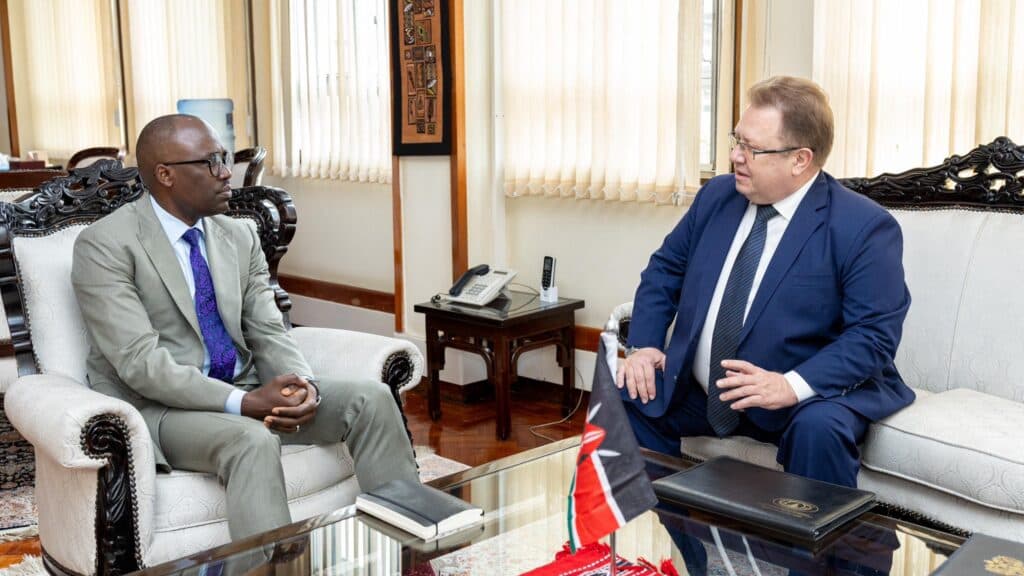We're loading the full news article for you. This includes the article content, images, author information, and related articles.
Kenya and Russia are establishing a formal migration framework to protect Kenyan citizens from exploitation and irregular recruitment into foreign conflicts, following concerns over Kenyans being coerced into military service in Ukraine.

Nairobi, Kenya – Kenya and Russia are actively working to formalise a framework for regular migration between the two nations. This diplomatic initiative, announced on Tuesday, October 7, 2025, by Foreign Affairs Principal Secretary Korir Sing'Oei, aims to enhance the protection of Kenyan nationals abroad and prevent their exploitation through irregular recruitment schemes.
The agreement follows bilateral talks in Nairobi between PS Sing'Oei and Russian Ambassador Vsevolod Tkachenko. The discussions underscored a mutual desire to deepen engagement in areas of shared benefit while addressing growing concerns over the irregular conscription of Kenyan citizens into the ongoing Russia-Ukraine conflict.
Reports of Kenyans being lured to Russia under false pretences, often with promises of lucrative jobs, only to find themselves in military service, have prompted urgent action from the Kenyan government. In September 2025, authorities in Athi River dismantled a recruitment ring that had allegedly trafficked over 20 Kenyans. Victims reported paying deposits for visas, travel, and accommodation, unaware they were being funnelled towards military deployment.
Just five days before the formal talks, on October 2, 2025, PS Sing'Oei disclosed that a third Kenyan, irregularly conscripted into the Russian army, was being repatriated. This followed the rescue and repatriation of three other Kenyans—Shaquille Wambo, Pius Mwika, and Derick Njaga—in September 2025, through coordinated efforts by the Ministry of Foreign Affairs and Kenya's diplomatic mission in Moscow.
Moscow has, however, assured Nairobi of its policy of zero tolerance towards the involuntary recruitment of foreign nationals into its security forces. Despite these assurances, Ukrainian forces have confirmed the capture of at least four Kenyans fighting for Russian forces.
The proposed migration framework is expected to establish structured, transparent, and legal pathways for labour mobility, thereby safeguarding citizens from predatory schemes. It will mandate that all job contracts are provided in both English and Russian, ensure consular access for Kenyan migrants, and establish clear mechanisms for labour dispute resolution.
Kenya currently lacks a standalone migration policy, with a draft from 2017 yet to be formally adopted. The State Department of Immigration, Border Control, and Citizen Services is responsible for Kenya's overall migration policy, and the National Coordination Mechanism on Migration (NCM) facilitates inter-agency collaboration.
Analysts suggest that this development will significantly influence near-term public debate and policy execution. Stakeholders are urging clarity on timelines, costs, and safeguards associated with the new framework.
The International Organization for Migration (IOM) and the African Development Bank (AfDB) signed a Memorandum of Understanding on October 3, 2025, to strengthen strategic cooperation on migration governance across Africa, highlighting the importance of well-managed migration for development.
The formalisation of migration pathways is crucial to mitigating the risks of human trafficking and exploitation. The previous informal recruitment channels have left many Kenyans vulnerable to deceptive practices, leading to their involvement in a foreign conflict.
The Russian government, facing a labour shortage estimated between 2.5 million and 4 million people, has been actively seeking foreign workers. This demand, while offering opportunities, also presents a risk if not managed ethically and transparently.
The two governments have agreed to expedite the conclusion of the migration framework. The success of this framework will depend on its swift and effective implementation, with key performance indicators including a reduction in illegal migration and guaranteed consular access for Kenyan citizens in Russia.
Observers will be closely watching the practical rollout of the promised framework, particularly how it addresses the vulnerabilities that led to irregular conscriptions. The effectiveness of the public awareness campaigns to educate young job seekers about the dangers of unregulated recruiters will also be critical.
Further, the diplomatic efforts to secure the release and repatriation of any remaining Kenyans captured while fighting in Ukraine will be a key indicator of the framework's success in protecting its citizens abroad.
Keep the conversation in one place—threads here stay linked to the story and in the forums.
Sign in to start a discussion
Start a conversation about this story and keep it linked here.
Other hot threads
E-sports and Gaming Community in Kenya
Active 9 months ago
The Role of Technology in Modern Agriculture (AgriTech)
Active 9 months ago
Popular Recreational Activities Across Counties
Active 9 months ago
Investing in Youth Sports Development Programs
Active 9 months ago